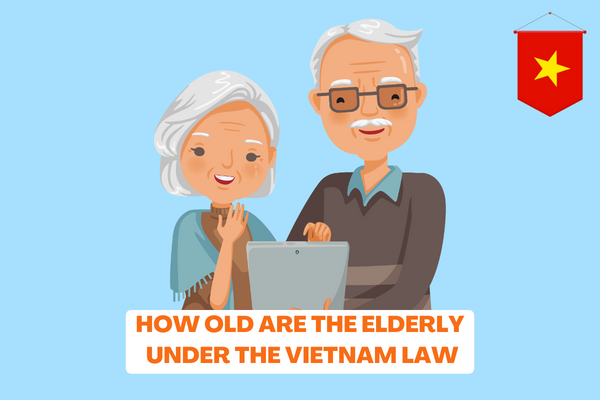How old are the elderly under the Vietnam Law? How is the State's policy towards the elderly regulated?
How old are the elderly under the Vietnam Law?
According to the provisions of Article 2 of the Vietnam Law on the Elderly 2009 on this content as follows:
Article 2. The elderly
The elderly defined in this Law are Vietnamese citizens aged full 60 or over.
Thus, the elderly as prescribed by Vietnam Law are Vietnamese citizens from full 60 years old or older.
In addition, the Vietnam Law stipulates June 6th of each year as Vietnam Elderly Day.

How old are the elderly under the Vietnam Law? How is the State's policy towards the elderly regulated?
How is the State's policy towards the elderly regulated in Vietnam?
According to the provisions of Article 4 of the 2009 Vietnam Law on the Elderly, the State's policies towards the elderly are as follows:
- To allocate appropriate annual budgets for the realization of policies to take care of and bring into full play the role of the elderly.
- To provide social patronage to the elderly under this Law and other relevant laws.
- To incorporate policies for the elderly into policies on socio-economic development.
- To develop gerontology so as to meet the elderly's medical examination and treatment needs; to train personnel to take care of the elderly.
- To encourage and create conditions for the elderly to do physical exercises; to participate in learning, cultural and spiritual activities: to live in a safe environment and be respected in dignity; to bring into play their role in the cause of national construction and defense.
- To encourage and support agencies, organizations and individuals in carrying out propaganda on and education about the sense of respect for and gratitude to the elderly, taking care of and bringing into full play the role of the elderly.
-To commend agencies, organizations and individuals that record outstanding achievements in taking care of and bringing into full play the role of the elderly.
- To strictly handle agencies, organizations and individuals that commit acts of violating this Law and other relevant laws.
What rights and obligations do the elderly have in Vietnam?
According to the provisions of Clause 1, Article 3 of the Vietnam Law on The Elderly 2009, the elderly have the following rights and obligations:
Article 3. Rights and obligations of the elderly
1. The elderly have the following rights:
a/To be guaranteed with basic food, clothing, lodging, movement and healthcare needs;
b/ To decide to live with their children, grandchildren or to live separately at their own will;
c/To be given priority in the use of services under this Law and other relevant laws:
d/ To be provided with conditions to participate in cultural, educational, physical training, sports, entertainment, tourist and recreation activities;
e/ To be provided with conditions to work in suitability to their health and professions and other conditions in order to bring into full play their role;
f/ To be exempt from contributions to social activities, except voluntary contributions;
g/ To be given priority in the receipt of relief in cash or in kind, healthcare and lodgings with a view to overcoming initial difficulties when they meet with difficulties due to consequences of natural disasters or other force majeure circumstances;
h/ To join in the Vietnam Elderly Association under the Association's charter;
i/ Other rights defined by law.
…
Thus, the elderly have the following rights and obligations:
- To be guaranteed with basic food, clothing, lodging, movement and healthcare needs;
- To decide to live with their children, and grandchildren or to live separately at their own will;
- To be given priority in the use of services under this Law and other relevant laws:
- To be provided with conditions to participate in cultural, educational, physical training, sports, entertainment, tourist and recreation activities;
- To be provided with conditions to work in suitability to their health and professions and other conditions in order to bring into full play their role;
- To be exempt from contributions to social activities, except voluntary contributions;
- To be given priority in the receipt of relief in cash or in kind, healthcare and lodgings with a view to overcoming initial difficulties when they meet with difficulties due to consequences of natural disasters or other force majeure circumstances;
- To join in the Vietnam Elderly Association under the Association's charter;
- Other rights defined by law.
LawNet
